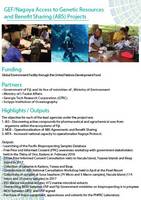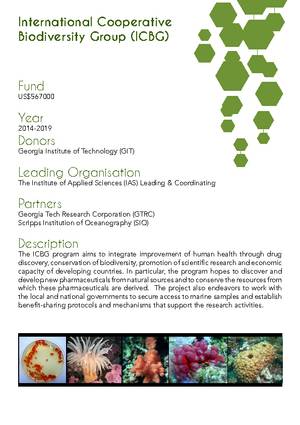PNPRC Projects
- Project Name: Pacific Islands Marine Bioinvasion Alert Network (PacMAN)
- Amount of Funding: $865,000 USD
- Donor Agency and Executive AgencyFlanders Government, through the Flanders UNESCO Science Trust Fund (FUST) and co-funded by the Richard Lounsbery Foundation
- Lead Agencies
University of South Pacific’s Institute of Applied Science leads & coordinates the research aspect locallyUNESCO/Intergovernmental Oceanographic Commission (IOC) through the Ocean Biodiversity Information System (OBIS) - Partners:
International –IOC Project Office for IODE, OBIS SecretariatIOC Science and Communication Centre on Harmful Algae
Global Ocean Observing System (GOOS)
Marine Biodiversity Observation Network of GEO (MBON)
International Maritime Organization (IMO)
South-West Pacific OBIS node hosted at NIWA (SWP-OBIS)
Genomic Observatories Metadatabase (GEOME)
Global Omics Observatory Network (GLOMICON)
Genomic Standards Consortium (GSC)
Genomic Observatories (GOs) Network
Global Autonomous Reef Monitoring Structures (ARMS) Programme
LifeWatch ERIC
Flanders Marine Institute (VLIZ)
OceanTeacher Global Academy (OTGA)
National – Fiji Invasive Alien Species Task Force
Biosecurity Authority Fiji (BAF)
Maritime Safety Authority of Fiji
Ministry of Waterways & Environment of Fiji
Regional – University of the South Pacific (USP) via Institute of Applied Sciences (IAS)
Secretariat of the Pacific Regional Environment Programme (SPREP)
The Pacific Community (SPC)
- Description
Alien Invasive species (AIS) are considered one of the greatest threats to biodiversity in the Pacific apart from climate change. The continuous changes in the environment and re-invasions or accidental introductions make eradication extremely difficult. It is extremely important that cost effective approaches to prevent such invasions is implemented rather than attempting to eradicate its establishment. There is a need, at both national and regional levels to address AIS in a holistic and coordinated approach to ensure that there are effective and systematic strategies available to detect the introduction and monitor the spread of AIS. Small Islands Developing States (SIDS) are particularly vulnerable to AIS incursions. In addition to the climate and biodiversity crises, marine bioinvasions also pose a real biosecurity risk for human health and the sustainability of livelihoods. Ship’s ballast water and vessel biofouling linked to the fast-growing blue economy, are the main vectors for the introduction and spread of AIS in the marine environment.The 3 year pilot project conducted in Fiji will develop a national invasive species monitoring plan using novel technologies to assist with the management of invasive species in country. Key in country contribution will be the development of an early-warning decision-support tool for Pacific SIDS, offering a user-friendly dashboard tool indicating the potential presence of invasive species (including pathogens and pest species) or risk of invasions to support local management. The overall coordination and implementation of the project will be from the IOC/OBIS’s head office in Oostende, Belgium while a local project manager and a project assistant hosted at the IAS will coordinate activities locally.7. Project Objectives
(i) A needs assessment and review of current best practices in invasive species detection(ii) Capacity building of local scientists in field sampling, sample processing, DNA sequencing and data management;(iii) Establishing and operating national invasive species monitoring plans with key partners and stakeholders;(iv) Building a bioinformatics pipeline to improve the availability of metabarcoding data for invasive species managers and feed these into global data infrastructures(v) Develop the decision-support tool with the assistance of an expert scientific advisory team and major local stakeholders
The Nagoya Protocol and its access to genetic resources and the fair and equitable sharing of benefits arising from their utilisation under the Convention on Biological Diversity is an international agreement. Fiji has ratified the Nagoya protocol in 2011 but has been using an ad-hoc Access and Benefit Sharing (ABS) policy consistent with the Convention on Biological Diversity and developed under the IAS’s International Cooperative Biodiversity Group (ICBG) programme as a precursor to draw up a legal framework especially for bioprospecting. Since 2014, the Institute of Applied Sciences (IAS) started a collaborative Global Environment Facility (GEF) project aimed at the establishment of a legal framework for Fiji’s ABS policy with key government line agencies of Ministry of Local Government, Housing, Environment, Infrastructure and Transport (MLHE), the Ministry of i-Taukei Affairs (MTA) and the Ministry of Fisheries and Forests (MoFF).
Click on the link below for full details on the project.
The ICBG program aims to integrate improvement of human health through drug discovery, conservation of biodiversity, promotion of scientific research and economic capacity of developing countries. In particular, the program hopes to discover and develop new pharmaceuticals from natural sources and to conserve the resources from which these pharmaceuticals are derived. The project also endeavors to work with the local and national governments to secure access to marine samples and establish benefit-sharing protocols and mechanisms that support the research activities.

